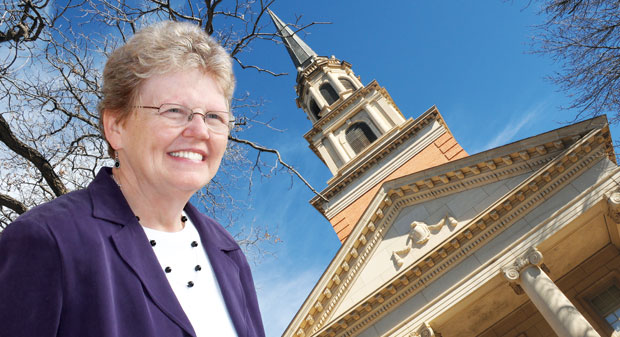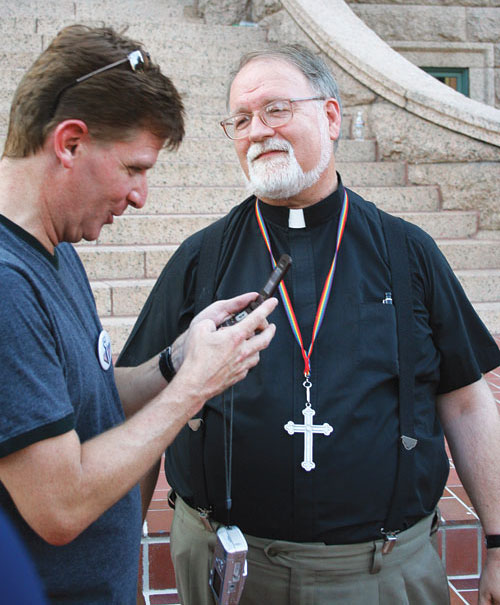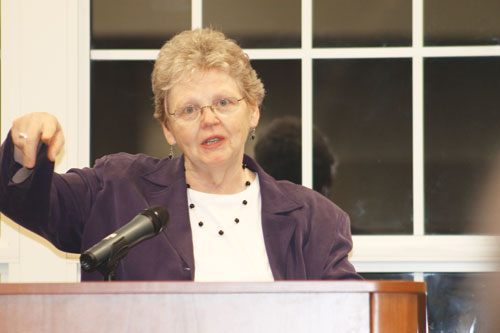Fort Worth divinity school affiliated with TCU continues to chart a remarkably LGBT-affirming course by appointing out lesbian Joretta Marshall as its dean

DEAN’S TO-DO LIST | Joretta Marshall said one of her goals is for no one to “question where Brite stands on global justice, racial justice or GLBTQ issues.” (Photo illustration by Kevin Thomas/Dallas Voice)
FORT WORTH — Joretta Marshall insists that her appointment as vice president and dean of Brite Divinity School doesn’t represent the first time a seminary has named a lesbian to such a position. After all, Marshall also served as dean at her previous institution.
When Brite President D. Newell Williams heard that her story would be on the cover of the Dallas Voice, he beamed, “We think she’s front page.”
And Williams, like everyone else at Brite, insisted that Marshall’s appointment wasn’t controversial — although he did qualify that by adding, with a sidelong glance and a smile, “Yet.”
Elaine Kellam chairs the Brite Board of Trustees and headed the search committee. She said that between 40 and 50 candidates applied for the position.
“We were looking for a highly qualified scholar,” Kellam said. “Someone who is well respected, well published and experienced as a dean. Sexuality was never an issue.”
Current Brite Vice President and Dean Nancy Ramsay said, “She’s terrifically qualified. We’re delighted she’ll be our next dean.”
As dean, Marshall’s goals are clear.
“I don’t want anyone to have any question where Brite stands on global justice, racial justice or GLBTQ issues,” she said.
She mentioned programs like the Carpenter Initiative in Gender, Sexuality, and Justice — a multi-year series of programs on gender, sexuality and justice. A five-year grant will allow the school to offer programs for churches, exhibits, panel discussions and conferences on LGBT issues. Last year, Marshall was named its director.
On Feb. 28, Marshall hosted a panel to discuss the dangers of reparative therapy. She said that Brite must do more than just teach that reparative therapy is dangerous — it must also offer alternatives in LGBT pastoral care. But she also said it’s imperative to teach ministers the school sends into the community how to address the church next door that may offer the discredited treatment.

THE CROSS HE BORE | Associate professor Stephen Sprinkle, right, shown at a rally following the Rainbow Lounge raid, said it was “pretty lonely” as a gay faculty member at?Brite in the 1990s. Sprinkle views Marshall’s appointment as vindication. (Dallas Voice file photo)
Marshall credits associate professor Stephen Sprinkle, Brite’s director of field education and supervised ministry, with pioneering much of the school’s attitude on sexual orientation. Sprinkle, who is openly gay, was hired in 1994.
He said Brite has played an important liberalizing role on the Texas Christian University campus — on race, women’s issues and on LGBT acceptance.
“We’re the friendly conscience of education in Fort Worth,” he said.
But Brite, which dates back to TCU’s founding in 1873 and has been an autonomous institution since 1914, hasn’t always been progressive in the area of LGBT inclusion.
In the early 1980s, when William Countryman, an Episcopal priest on the Brite faculty, came out, he was forced to leave the school. Later that decade, openly gay student
Allen Harris had his ordination in Disciples of Christ opposed by the then dean of Brite.
Sprinkle said that before he was hired, things began to change.
“They made a quiet decision to allow gay and lesbian couples to live together in married student housing,” he said. “Les Perdue, [former] president of Brite, broke all that ground.”
Sprinkle was hired as an openly gay man with full support of Brite’s administration, if not TCU’s.
“There were times when it was pretty lonely,” he said.
He sees the elevation of Marshall as vindication and said he’s proud the school is willing to take risks.
Kellam is also proud of the choice, but doesn’t see it as a risk.
“No one else was as well qualified,” she said.
Kellam said they simply chose the best candidate and as a bonus, she’s already on campus, saving the institution the year of adjustment someone coming from the outside would face.
Williams also dismissed any idea of controversy surrounding the appointment.
“Several members of the faculty and several trustees have normalized sexual orientation,” he said.
Marshall is an ordained United Methodist minister. She said that as a lesbian in a long-term relationship, charges could be brought against her by that church.
But she maintains membership in the Rocky Mountain Conference, where a woman serves as bishop, rather than in the more conservative Southwest Texas Conference.
Normally if charges are filed against a minister in the Methodist Church, those charges are brought within his or her own conference.
“But I’m waiting for the other shoe to drop,” Marshall said.
She described her career path as if she’s avoided controversy through the years.
“I followed the open and affirming route,” she said.

OUTSPOKEN | Marshall, shown at a panel discussion on the dangers of reparative therapy this week, said as a Methodist minister in a lesbian relationship, she risks discipline. But she said she’s taken the “open and affirming route” in the church. (David Taffet/Dallas Voice)
Marshall said she has steered her career more toward academics, although after several years as a college chaplain she served as pastor to a small congregation in her native
Wisconsin soon after graduating divinity school in the 1980s. The Wisconsin church remains dear to her heart.
“The issues I was concerned about were, ‘What does it mean to be a church that stands for justice?’ After all, I grew up a child of the 60s,” she said.
In 2007, Brite hired her as professor of pastoral theology, pastoral care and pastoral counseling. She came from Eden Theological Seminary in St. Louis, where she served as academic dean from 2001 until 2005.
Before that, she was associate dean for academic affairs from 1998 until 2000 at Iliff School of Theology in Denver.
She moved to Fort Worth with her family — her sister, her mother and her longtime partner, Joy Allen, who is a counselor.
Marshall first realized she wanted to be a minister in fifth grade. She’s glad her mother didn’t discourage her or explain that women — at the time — weren’t ordained. By the time she was in school women were already serving in the ministry and she pursued her dream.
While she speaks gently and affectionately about her love of God and religious faith, she also approaches her work with some mischievousness.
“There’s something subversive about teaching students who are going to become parish pastors who can change institutions,” she said. “You’re transforming students who are going to be leaders. It’s an incredible gift to be able to do that.”
She said that’s part of what’s kept her in theological education.
“It would be easy to give up on the church and let the hurts and the pains of the church — especially for LGBTQ communities — overwhelm any good feeling I have for the church,” she said. “But I really do believe there’s a way the church can move the world to greater justice, to greater peace and toward greater wholeness.”
Kellam said one of the factors her committee considered was the candidate’s published works. Much of Marshall’s writing concerns pastoral care for the LGBT community.
Her book, Counseling Lesbian Partners, teaches pastors to consider the dynamic of two women in a relationship. She said she specifically geared it toward lesbian relationships and said gay male relationships have a completely different dynamic.
Another book is on forgiveness. She said the idea for that one developed after she was asked to talk to a PFLAG group about issues of forgiveness around the holidays.
“How do you forgive someone who wants to harm us?” she asked. “Sometimes it’s about holding people accountable. How do you forgive a church that continues to make it unsafe? Or tolerance that is really a notch away from hatred? Culture encourages forgiveness when we ought not give it so fast.”
Marshall is always quite thoughtful in her discussion of God and religion. She compared her approach to that of more fundamentalist denominations.
“We don’t have quick answers to hard questions,” she said.
While Marshall is not the first lesbian dean of a divinity school, her appointment is noteworthy. In addition to her own previous appointments at other schools, seminaries in
Berkeley, Calif. and Chicago have had openly gay deans.
But naming Marshall dean of a divinity school in Texas is certainly surprising — at least for anyone who hasn’t followed the progress at Brite.
Earlier this year, the school was named to a list of religious institutes that prepare clergy to address sexuality issues. Just 20 seminaries, divinity and rabbinical schools appear on the list. Brite is the only one named in Texas or in any of the surrounding states.
Marshall’s appointment is effective June 1. And in her new position, she intends to continue pushing Brite to the forefront of progressive religious education.
This article appeared in the Dallas Voice print edition March 2, 2012.











My hat is off to you and your school. I am a Methodist, and I am very active in the Methodist Church. As a young man I studied in Methodist colleges. My plan was to become a Methodist minister, But I got caught up in the hate and discrimination. I changed my course of study, I fully support you with my attitude, thoughts and prayers. I am fully aware that the attitudes and the teachings of the Methodist and other progressive centers are changing. I stand with you in an openly gay life style and look forward to more change.
Congratulations to Brite and to Professor, soon-to-be Dean Marshall. Brite’s decision and Joretta’s approach display God’s justice and loving-kindness to all. I’m proud to be a Brite supporter.